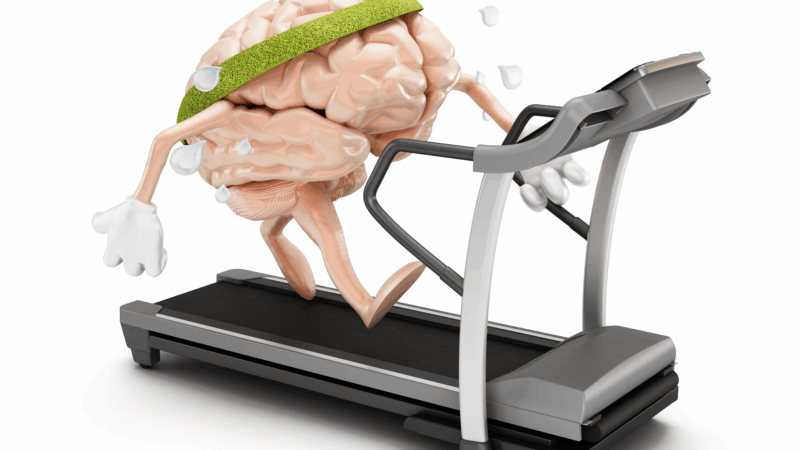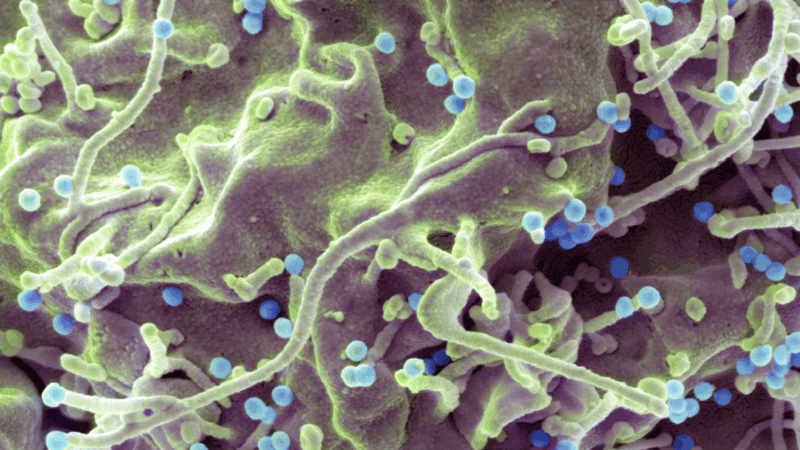Mental exercise can reverse a brain change linked to aging, study finds
Scientists are reporting the first compelling evidence in people that cognitive training can boost levels of a brain chemical that typically declines with age.
A 10-week study of people 65 or older found that doing rigorous mental exercises for 30 minutes a day increased levels of the chemical messenger acetylcholine by 2.3% in a brain area involved in attention and memory.
The increase “is not huge,” says Étienne de Villers-Sidani, a neurologist at McGill University in Montreal. “But it’s significant, considering that you get a 2.5% decrease per decade normally just with aging.”
So, at least in this brain area, cognitive training appeared to turn back the clock by about 10 years.
The chemical change observed after intensive brain training is persuasive, says Michael Hasselmo, director of the Center for Systems Neuroscience at Boston University, who was not involved in the study.
“It was compelling enough that I thought, ‘Maybe I need to be doing this,'” he says.
The result backs earlier research in animals showing that environments that stimulate the brain can increase levels of certain neurotransmitters. Studies of people have suggested that cognitive training can improve thinking and memory.
Never skip brain day
The study, funded by the National Institutes of Health, comes amid a proliferation of online brain-training programs, including Lumosity, Elevate, Peak, CogniFit and BrainHQ.
But it has been hard to know whether these programs really work, says de Villers-Sidani, who directs the cognitive disorders clinic at McGill’s Montreal Neurological Institute.
“They had a positive impact on some cognitive measures,” he says, “but then the question was, how much is it changing the brain and how is it changing the brain?”
So de Villers-Sidani and a team of researchers decided to see whether mental exercise could increase levels of acetylcholine, a neurotransmitter that’s closely associated with cognitive performance.
Acetylcholine levels typically begin a gradual decline around middle age. The levels drop sharply, though, in people with Alzheimer’s disease.
The team studied 92 healthy people who were 65 or older.
Half the participants spent 30 minutes a day playing computer games like solitaire and Candy Crush.
The others spent the same amount of time each day doing cognitive exercises that are part of the scientifically tested program BrainHQ. The program challenges users to remember the type and location of items that appear and disappear with increasing speed.
“It’s really targeted at attention and speed of processing, and it kind of pushes you to the limit,” de Villers-Sidani says.
The researchers used a special kind of PET scan to detect changes in acetylcholine levels in the anterior cingulate cortex, a brain region that’s important for making decisions and detecting errors.
“I was not sure we would find anything, to be honest,” de Villers-Sidani says.
But they did. In people who played games like solitaire, acetylcholine levels were unchanged. But in people who did cognitive training, there was a significant increase.
Acetylcholine levels also increased in other brain areas, including the hippocampus, which plays a key role in memory.
Even modest changes are meaningful, Hasselmo says, because acetylcholine does more than carry messages in the brain. It also modulates the behavior of neurons in ways that affect learning, memory and attention.
So when a person takes, say, a high dose of the motion sickness drug scopolamine — which blocks the effects of acetylcholine — things start to go awry.
“If you block the neuromodulator function in the brain, a person can’t even think,” Hasselmo says. “You go into a delirious state.”
On the other hand, even small increases in acetylcholine can have a “profound and notable effect” on memory and thinking in older people.
Hasselmo notes that the earliest Alzheimer’s drugs reduced symptoms by increasing levels of acetylcholine. Now, he says, intensive brain training has the potential to achieve similar gains and stave off cognitive decline.
Transcript:
MARY LOUISE KELLY, HOST:
Scientists have produced the first compelling evidence that mental exercise can cause biological changes in a human brain. NPR’s Jon Hamilton reports on a new study showing that intensive cognitive training reversed a process associated with aging.
JON HAMILTON, BYLINE: The internet is filled with brain-training programs that promise to improve thinking and memory. But Etienne de Villers-Sidani of McGill University in Canada says it’s been hard to know whether they really work.
ETIENNE DE VILLERS-SIDANI: They had a positive impact on some cognitive measures, but then the question was, how much is it changing the brain, and how is it changing the brain?
HAMILTON: So De Villers-Sidani and a team of researchers decided to see whether mental exercise could increase levels of a chemical messenger that’s closely associated with cognitive performance. It’s called acetylcholine. He says levels tend to fall starting in middle age.
DE VILLERS-SIDANI: For every decade after the age of 40, 45, you get around 2.5% decline in this neurotransmitter in key brain areas.
HAMILTON: The decline is much faster in people with Alzheimer’s disease. The researchers studied 92 healthy people who were at least 65 years old. De Villers-Sidani says during the 10-week study, half of the participants spent 30 minutes a day doing mental exercises. These came from a science-backed cognitive training program called Brain HQ.
DE VILLERS-SIDANI: Which is really targeted at attention and speed of processing, and its characteristic is that it kind of pushes you to the limit.
HAMILTON: By asking you to remember more and more in less and less time – other participants spent their time playing video games like Solitaire and Candy Crush. The researchers used a special kind of PET scan to detect changes in acetylcholine levels. De Villers-Sidani says they focused on the anterior cingulate cortex, a brain region that’s important for making decisions and detecting errors.
DE VILLERS-SIDANI: I was not sure we would find anything, to be honest.
HAMILTON: But they did. In people who played video games, acetylcholine levels were unchanged. But De Villers-Sidani says in people who did cognitive training, there was a meaningful increase.
DE VILLERS-SIDANI: It was about 2.3%, which is not huge, but it’s significant considering that you get a 2.5% decrease per decade, normally just with aging.
HAMILTON: So at least in this brain area, cognitive training appeared to turn back the clock by about 10 years. Acetylcholine levels also increased in other brain areas, including the hippocampus, which plays a key role in memory. The study, funded by the National Institutes of Health, appears in the journal JMIR Serious Games. Michael Hasselmo, a neuroscientist at Boston University, says he was impressed by the result.
MICHAEL HASSELMO: It was compelling enough that I looked up the task myself and thought, maybe I need to be doing this task.
HAMILTON: Hasselmo has spent much of his career studying acetylcholine, which is a chemical messenger that also modulates the behavior of neurons.
HASSELMO: If you block the neuromodulator function in the brain with a drug such as scopolamine, a person can’t even think. You basically go into a delirious state.
HAMILTON: Low levels of acetylcholine are a hallmark of Alzheimer’s and appear to contribute to the declines in memory and thinking. But Hasselmo says even small increases in this neurotransmitter can noticeably improve cognitive function. He says a cup of coffee boosts levels enough to improve attention and speed up reactions.
HASSELMO: Changing things by 2.5% could have a pretty profound and notable effect even on a subjective level.
HAMILTON: Hasselmo says the first Alzheimer’s drugs reduce symptoms by increasing acetylcholine. Now, he says, it looks like hardcore brain training can offer a similar benefit. Jon Hamilton, NPR News.
(SOUNDBITE OF MUSIC)
A new one-a-day-pill holds promise for HIV’s ‘forgotten population’
It's designed to take the place of complicated, multiple drug regimens that many people with HIV need to follow. And it's also beneficial because the HIV virus is always evolving.
For filmmaker Chloé Zhao, creative life was never linear
Director Chloé Zhao used meditation, somatic exercises and dance to inspire the cast and crew of this Oscar-nominated story about William Shakespeare's family.
10 new books in March offer mental vacations
March is always a big one for books – this year is no different. We call out a handful of upcoming titles for readers to put on their radars — offering a good alternative to doomscrolling.
Sen. Chris Coons, D-Del., talks about the war with Iran and upcoming war powers vote
NPR's A Martínez asks Delaware Democrat Chris Coons, a member of the Senate Foreign Affairs Committee, about the war with Iran.
The candy heir vs. chocolate skimpflation
The grandson of the Reese's Peanut Butter Cups creator has launched a campaign against The Hershey Company, which owns the Reese's brand. He wants them to stop skimping on ingredients.
Scientists make a pocket-sized AI brain with help from monkey neurons
A new study suggests AI systems could be a lot more efficient. Researchers were able to shrink an AI vision model to 1/1000th of its original size.







